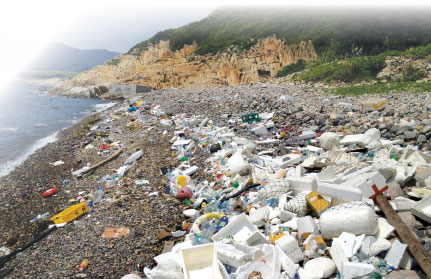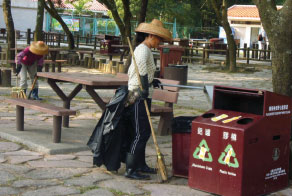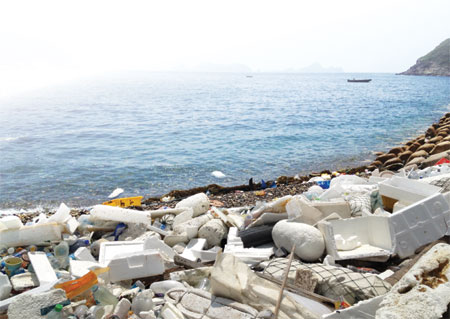Blots on the landscape
Updated: 2012-11-13 07:14
By Simon Parry(HK Edition)
|
|||||||||
|
A mixture of litter dumped by weekenders and washed in by sea transforms a peaceful and idyllic stretch of Hong Kong coastline into an eyesore. All Photos: Red Door News |
Hong Kong's beaches and coastline are being blighted by a tide of rubbish and the authority is not doing enough to tackle the problem, environmentalists complain. Simon Parry reports on an issue that could be tarnishing Hong Kong's image.
Each autumn, Carol Biddell organises a small but enthusiastic band of volunteers to spend a day clearing the rubbish and tidying up an attractive stretch of beach and coastline on the outskirts of Sai Kung. This year, however, her clean-up has been called off.
"I cancelled it," she explained. "Why should we be cleaning up after these people when they come out week after week and leave their trash and they can't be bothered to take their mess from the barbecue pits to the bins, even though it's only a few steps away?"
Biddell, environment officer for the pressure group Friends of Sai Kung, is exasperated at what she sees as the lack of enforcement of litter laws which she says encourages weekenders who pour into the popular resort for barbecues and picnics to leave their litter behind.
The situation is so extreme that a volunteer from the group recently spent a Sunday at a barbecue site in Wong Shek Pier in Sai Kung Country Park handing out home-made leaflets to visitors appealing to them not to leave litter behind.
"This year, it just seems to be so much worse than in the last few years," Ms Biddell said. "We are trying to get people to take away their rubbish, but why aren't we doing something to stop it. I wrote to the police and they said they are too busy.
"A lot of the rubbish is generated by people who come out to the barbecue pits or for boat trips. They are not regular visitors and they take the attitude that someone will pick up their rubbish because there are people who are paid to do it.
"We have (anti-littering) laws but no one is enforcing them. At the same time we promote beach and countryside clean-ups. But why should we be doing this. We are encouraging people to be lazy and they get away with it because even though we have the law the police aren't willing to enforce it because they don't have the time and can't be bothered."
Biddell's exasperation follows an email exchange with an official from the Food and Environmental Hygiene Department (FEHD) when she complained about the amount of litter left after a busy autumn weekend.
An FEHD official replied: "Follow-up inspections by staff of this department to the public places at Sai Kung Town and beaches on islands around Sai Kung revealed that the general hygienic condition of public place thereat was satisfactory."
Biddell responded by sending the official a selection of photographs of waste piled on beaches and public places which she said proved the situation was anything but satisfactory.
She wrote: "After every weekend and public holiday you send teams of people to clean up after the thoughtful visitors who leave this mess. Why can't you put representatives at the key sites and give out warnings and issue summonses and put a stop to them creating this appalling mess?"
|
Cleaners sweep up the mess left by weekend visitors to a barbecue area in Sai Kung Country Park. Green groups say people too readily leave rubbish in the expectation that others will tidy up the place after them. |
The problem of litter-blighted beaches and coastlines is a territory-wide headache, according to the Green Council, a coalition of industry figures and academics that organises an annual coastal clean-up around Hong Kong involving more than 2,000 volunteers that has picked up more than 7,000 kilograms of waste since 2008.
"Litter along the coastline has always been there but after this August with the plastic pellets situation (when hundreds of millions of plastic pellets washed ashore after a typhoon) people have become more aware," said the group's chief executive officer Linda Ho.
"It appears as though waste management is not considered a priority for Hong Kong's image and reputation. Only places of high attraction are handled, but non-popular destinations are not cleaned up."
Beaches that came under the control of the Leisure and Cultural Services Department (LCSD) were well maintained and clean, Ho said. "However, when you go to non-managed beaches, they are extremely dirty," she said. "The government can do more to clean these beaches as well. Even if they are not LCSD-operated, they are still part of Hong Kong."
Paul Etherington, whose company Kayak and Hike runs adventure courses off the coast of Sai Kung, has documented the litter problem along the coastline by taking photographs of beaches and coastline covered in rubbish over the past 20 years. "The situation isn't getting any better," he said with an air of resignation.
"I think there is a little bit more education out there. People in general have an idea of what is going on but to be honest, there is a high majority of people who just don't give a damn.
"What we don't understand is how people can spend a whole day getting to a picturesque spot and then leave their rubbish there. Why do people take the trouble to hike to the top of a mountain or go out to a remote beach and then leave their rubbish behind? It is beyond comprehension.
"Everyone blames the government for not cleaning up but to be honest it is not always them to blame. Admittedly they could be a lot more proactive and do more, but people are ignorant There are plenty of bins and lots of (publicity) material out there saying 'Don't leave your rubbish behind, take it away' but there are a lot of people who totally ignore that."
Etherington's groups enthusiastically join in beach clean-ups but he admitted he did not think they ultimately had a great impact on the littering problem. "You do all these things and it still doesn't get any better," he said.
"They (the clean-ups) are generally once a year, once-in-a-blue-moon attempts at highlighting the problem and cleaning a beach up, but your average guy doesn't give a monkey's about beach clean-ups.
"He comes out the next weekend, and whether it in the summer out in boats and in the winter out hiking, he still leaves his rubbish behind."
The constant blight of rubbish strewn across remote beaches was a deterrent to visitors, Etherington argued. "More and more people want to go out and see these places," he said. "We take clients out and the beaches are just full of plastic and rubbish and polystyrene boxes and trash cans from people who barbecued the day before.
"It doesn't look good. In the city, everyone says what a fantastic, clean place Hong Kong is. But you come out to the Sai Kung waterfront or some of the beaches after the weekend and it's a crying shame. It really is."
Etheringon said he believed education rather than prosecution was the answer to the problem. "I'm not really pro-prosecution," he said. "I would rather people were educated and advised. If you go around hitting people with a big stick it might work but I don't think it's necessarily the best way."
Another measure would be to remove bins from beaches, he suggested. "We always take our rubbish away and we never leave it in the bins on the beach," he said. "That is part of the problem. In other countries, there aren't bins and everyone tends to be responsible with their own rubbish which is all we are asking."
Responsibility for keeping beaches and coastal areas clean falls across a bewildering variety of government departments.
The FEHD is responsible for administering the spot littering fines of HK$1,500, while the Agriculture, Fisheries and Conservation Department (AFCD) is responsible for litter collections and fines in country parks including hiking trails and coastal areas. Meanwhile the LCSD has responsibility for gazetted beaches, while the Environmental Protection Department takes responsibility for marine rubbish.
|
A government working party has been set up to tackle the problem of marine refuse washing up on beaches around Hong Kong. |
FEHD figures suggest the number of people given fixed penalty notices for littering remains relatively stable with 23,500 fines issued in 2012 to the end of September, compared to 31,500 in 2011, 30,800 in 2010 and 32,000 in 2009. There was no breakdown for fines issued in rural and urban areas, a spokeswoman said.
She added: "Apart from taking enforcement action during their daily routine, FEHD staff also conduct blitz operations at irregular hours against litter offenders. The FEHD also arranges publicity and health education to encourage the public to keep Hong Kong clean."
A spokesman for the LCSD said it was responsible for the management of gazetted beaches and said: "Large-scale publicity campaigns are launched every year to promote the public awareness of keeping our beaches clean.
"Besides putting up notices and making regular announcements to appeal to beach-goers not to litter, educational activities and also organised jointly with local schools and NGOs to strengthen community involvement in these campaigns.
"Bins are provided at convenient locations all around the beach areas to facilitate the disposal of rubbish. We also arrange cleansing workers to remove rubbish in the beach areas and barbecue sites on a daily basis."
The spokesman said that the amount of litter collected from beaches in the Sai Kung area had declined in the past three years from 1,152 tonnes in 2009 to 1,020 tonnes in 2010 and 953 tonnes in 2011.
An AFCD spokesperson said the amount of litter collected in Sai Kung Country Park had risen from 839 tonnes in 2009 to 912 tonnes in 2011 although that may in part be caused by the extension of its litter service to four outlying islands areas since last year. A total of 663 tonnes were collected from January to September this year.
In country parks across Hong Kong, AFCD staff issued 310 fixed penalty notices for littering in 2011 compared to 377 in 2010 and 362 in 2009, the spokesperson said. From January to September this year, 228 fixed penalty notices were issued.
The spokesperson said: "AFCD will continue to deploy staff to patrol country parks and monitor the situation. Additional litter collections will be arranged during weekend and public holidays if necessary.
"Posters are displayed at the recreational sites and signs have been put up at the entrances to and along hiking trails in the country parks to advise visitors to keep the country parks clean and not to leave any litter behind."
In the view of Biddell, it is partly the sheer number of government departments assuming different responsibilities for the same coastal areas that makes it such a challenge to keep coastal areas in Sai Kung and elsewhere free from litter.
"Some bits belong to the AFCD, some bits belong to the LCSD and some belongs to the Home Affairs Department and each cleaning team will not clean the other's part," she said.
"So you might have a grassy area and a sitting out area and a barbecue pit in one place, and there will be three different departments responsible for cleaning it. If there is litter in the flower beds, the people cleaning the pavements next to them say it's not their responsibility to clean it up. And that is absolutely ridiculous."
(HK Edition 11/13/2012 page4)


